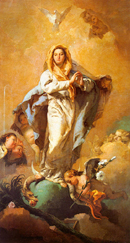
Precept: from the Latin: prŠceptum from prŠcipere,
to command hence 'The Precepts of the Church'
are also called 'The Commandments of the Church'
for they are not merely suggestions or counsels but rather the
precepts impose an obligation. (Catholic Encyclopedia). They
are six in number:
1. To keep the Sundays and Holy Days, holy, by hearing Mass
and resting from servile work.
2. To keep the days of fasting and abstinence appointed by the
Church.
3. To go to confession at least once a year.
4. To receive Holy Communion at least once a year and that during
Eastertide.
5. To contribute to the support of our pastors.
6. To observe the laws of the Church concerning marriage.
We welcome to Our Lady of Victory Chapel all who wish to adhere
faithfully to the sacred traditions of the Roman Catholic Faith
and thus to receive the abundant graces from the Holy Sacrifice
of the Mass and the sacraments administered according to the unchanged
and unchangeable rite of the Roman Catholic Church.
It is then obvious that simple justice as well as the fifth
precept of the Church dictate that those who benefit from that
which is provided have an obligation to contribute to the support
of this chapel.
Sadly, there are those who benefit from what is made available
but yet fail to help defray the expenses which we must necessarily
incur to provide the Holy Sacrifice of the Mass and the sacraments
as well as other devotions.
Such miserly individuals place an unfair burden upon those
of you who do support this chapel. Those who fail to contribute
regularly according to their means shall answer before the judgement
seat of Almighty God.

The word 'tithe' comes from the Anglo-Saxon 'teotha
'= a tenth.
A tithe is then defined as: "a tenth part of one's
annual income contributed or due as a tax, especially for the
support of the clergy or church; to contribute or pay a tenth
part of one's annual income."
and
"the tenth part of all fruits and profits justly acquired,
owed to God in recognition of his supreme dominion over man,
and to be paid to the ministers of the church".
According to St. Paul: "Know you not, that they who work
in the holy place, eat the things that are of the holy place
and they that serve the altar partake with the altar?" (
I Corinthians 9:13)
We read in the Catholic Encyclopedia:
"In the Church, as those who serve the altar should
live by the altar, provision of some kind had necessarily to
be made for the sacred ministers. In the beginning this was
supplied by the spontaneous offerings of the faithful. In the
course of time, however, as the Church expanded and various
institutions arose, it became necessary to make laws, which
would insure the proper and permanent support of the clergy.
The payment of tithes was adopted from the Old Law, and early
writers speak of it as a divine ordinance and an obligation
of conscience. The earliest positive legislation on the
subject seems to be contained in the letter of the bishops assembled
at Tours in 567 and the canons of the Council of Mašon in 585.
In the course of time, we find the payment of tithes made obligatory
by ecclesiastical enactments in all the countries of Christendom.
The Church looked on this payment as "of divine law, since
tithes were instituted not by man but by the Lord Himself"
(C. 14, X de decim. III, 30)."
How few there are amongst those who regularly assist at the
Holy Sacrifice of the Mass at Our Lady of Victory Chapel who
benefit from the graces of the sacraments who in fact fulfill
the duty in conscience to tithe.
May Almighty God bless those who do and may those who do not
repent and make restitution for the tithes which in the past
they have failed to render thus unjustly burdening others and
shirking their obligations to Almighty God and His Church.







